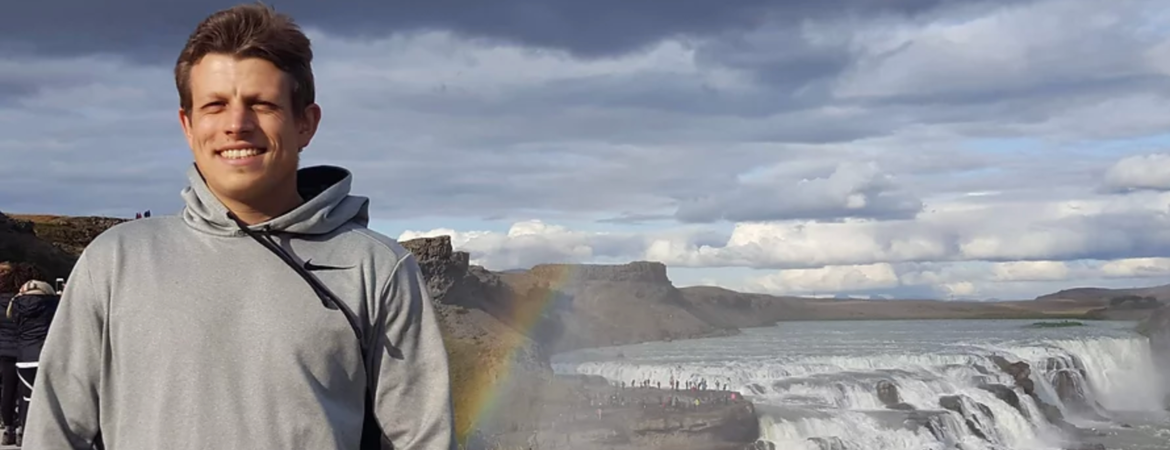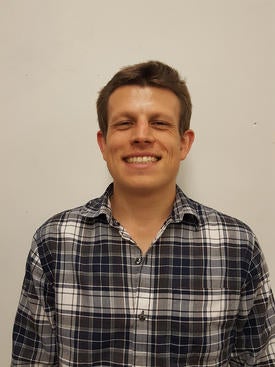
Name: Colby M. Ostberg
Program: Ph.D. in Geological Sciences (with a focus on Exoplanets and Venus)
Hometown: Seaside, CA
www.colbyostbergphd.com
As a first generation college student, can you describe some of the obstacles you faced and how you overcame those challenges to get to this point in your academic career?
For my undergraduate studies, I was completely unaware of the amount of work that would be needed to be successful in academia. This quickly led to being overwhelmed by the large workload, and me struggling heavily in my physics classes (which was my major). I got out of my slump through meeting awesome and supportive people that really helped me turn everything around.
The main issue I have faced in graduate school has been the sheer intimidation of working in the same field as so many brilliant people. Seeing how smart and experienced people are in Exoplanets led me to doubt my ability to do science at this level. However, through the support of Stephen Kane, my research group, friends, and family, I have allowed my confidence to grow which has helped me realize that I am here for a reason and that I can do anything I set my mind to.
Since arriving at UCR, please share your experience in your Ph.D. program and working with Professor Stephen Kane.
Transitioning to graduate school has been a very challenging experience. During undergrad, I grew comfortable with the structure and deadlines associated with classwork. But with research at the graduate level, you work on your own time, and creating a work schedule and deadlines for yourself is a skill that I am still trying to improve. But the research itself is invigorating, and focusing on a science question and using the skills that you have learned over time to try and investigate the topic is extremely rewarding.
The main reason I applied to UCR is because of Stephen Kane; I took an exoplanets class with him in my undergrad. And since my arrival to UCR, he has been extremely supportive and vital for my growth as an amateur scientist. He is so friendly and approachable, and this, as well as his work ethic and drive have made him the model scientist and person that I am striving to be.
Tell us about your research interests, what your current research is about, and how you became interested in this field.
While trying to obtain my B.S. in Physics at San Francisco State University, I had no idea what I wanted to pursue after graduation. But I ended up taking an Exoplanet course taught by Stephen Kane which became the first topic that I could actually see myself focusing on in the future. This led me to apply to UCR so that I can work with Stephen and start a career in exoplanets. I am currently focused on studying Venus-like exoplanets, and the geology of Venus. Specifically, I am working towards developing ways to differentiate a Venus-like exoplanet from an Earth-like exoplanet by observing their atmospheres, predicting where around stars we can expect to find Venus-like planets, and determining when planets will enter a runaway greenhouse. The Venus geology area of my work has consisted of calculating the thickness of the Venusian lithosphere, which helps us estimate the flow of heat from Venus' interior to its surface, and can be used to update models of Venus' evolution.
Much of your time as a Ph.D. student is dedicated to your research, publishing papers, and being in the classroom, but you also manage to find the time to be a year-round intern at the NASA Jet Propulsion Laboratory. What can you tell us about your work with NASA?
I am working with the amazing Suzanne Smrekar at NASA JPL in Pasadena. Her main area of work involves Mars, as she is the lead of the Mars INSIGHT mission. But she works on Venus as well, and together we have been analyzing Magellan radar and altimetry data using mapping software to look for signs of lithospheric flexure around these features called coronae on Venus. By fitting the topographical profiles of flexure signatures to different models, we can determine how thick the lithosphere would need to be to cause the observed flexure. We are then comparing these results to other estimates of lithospheric thickness derived from Magellan gravity data to strengthen the argument that thin lithosphere is a regional phenomenon on Venus. This work is important because Venus is believed to have a globally thick lithosphere, otherwise known as a stagnant lid, but our results are disproving this by showing that Venus' lithosphere is generally thick, but there are many regions which Venus' lithosphere has a comparable thickness to that of Earth.
What are your plans after you graduate from UC Riverside?
I am not exactly sure what I want to do after receiving my Ph.D., but I am considering two options. My experience in being a teaching assistant has helped me learn that teaching is very gratifying for me. So pursuing a professorship is a likely option, as I would love to help people get excited about science and help them understand how important it can be to be knowledgeable of basic science concepts, especially in this time of severe denial of climate change and the growing lack of trust towards scientists. My second option would be a research position at JPL. Working full-time has always been a goal of mine, and I believe the people and resources at JPL would be great for increasing the impact of my research and building my reputation in the field. This position would not include teaching, but would leave the opportunity to pursue teaching down the line.
How is your experience at UCR helping you to accomplish your goals?
The Geology department at UCR has exceeded my expectations. Their pathway to a Ph.D. is both reasonable and challenging, and has allowed me to get a head start on my research whereas other programs would have caused me to be bogged down by large amounts of classwork. And all of the faculty and students have been very friendly and approachable and are always willing to help me out and answer any questions or concerns I might have.
